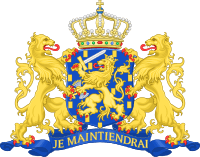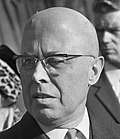Second Drees cabinet
The Second Drees cabinet, also called the Third Drees cabinet[1] was the cabinet of the Netherlands from 2 September 1952 until 13 October 1956. The cabinet was formed by the political parties Labour Party (PvdA), Catholic People's Party (KVP), Anti-Revolutionary Party (ARP) and the Christian Historical Union (CHU) after the election of 1952. The grand coalition (Roman/Red) cabinet was a majority cabinet in the House of Representatives.[2]
| Second Drees cabinet Third Drees cabinet | |
|---|---|
45th Cabinet of the Netherlands | |
  The first meeting of the Second Drees cabinet on 2 September 1952 | |
| Date formed | 2 September 1952 |
| Date dissolved | 13 October 1956 (Demissionary from 13 June 1956) |
| People and organisations | |
| Head of state | Queen Juliana |
| Head of government | Willem Drees |
| Deputy head of government | Louis Beel |
| No. of ministers | 17 |
| Total no. of members | 16 |
| Member party | Labour Party (PvdA) Catholic People's Party (KVP) Anti-Revolutionary Party (ARP) Christian Historical Union (CHU) |
| Status in legislature | Grand coalition (Roman/Red) |
| Opposition party | People's Party for Freedom and Democracy |
| Opposition leader | Pieter Oud |
| History | |
| Election(s) | 1952 election |
| Outgoing election | 1956 election |
| Legislature term(s) | 1952–1956 |
| Incoming formation | 1952 formation |
| Outgoing formation | 1956 formation |
| Predecessor | First Drees cabinet |
| Successor | Third Drees cabinet |
 |
|---|
| This article is part of a series on the politics and government of Netherlands |
|
|
Local government
|
|
Related topics |
Term
The economic recovery after World War II continued. This made further expansion of social security possible, of which the best example is the institution of the state pension AOW in 1956. Also, a major housing scheme was executed, building 80 000 houses per year.
A major setback was the North Sea flood of 1953, which resulted in damage equivalent to 5% of the GDP. An emergency law was made to recover the dykes and plans were made for the Delta Works, the world's largest flood protection project, which should protect the South West Netherlands against another such combination of storm and spring tide.
An episcopal 'mandement' called for Catholics to give up their PvdA-membership, but without result.
The 29 December 1952 Statute for the kingdom granted Surinam and the Netherlands Antilles a certain degree of independence within the kingdom.
On 15 February 1956 the Dutch-Indonesian Union officially ended. Relationships between the two countries continued to deteriorate.
When the PvdA voted with the opposition over a combined law to lower taxes and raise rents on 17 May 1955, this led to a crisis. The cabinet fell, but returned after 17 days when PvdA chairman Burger had reconciled the parties.
Cabinet Members
| Ministers | Title/Ministry | Term of office | Party | |||
|---|---|---|---|---|---|---|
 |
Dr. Willem Drees (1886–1988) |
Prime Minister | General Affairs | 7 August 1948 – 22 December 1958 [Retained] |
Labour Party | |
 |
Dr. Louis Beel (1902–1977) |
Deputy Prime Minister | Interior | 2 September 1952 – 7 July 1956 [Res] |
Catholic People's Party | |
| Minister | 6 December 1951 – 7 July 1956 [Retained] [Res] | |||||
 |
Dr. Julius Christiaan van Oven (1881–1963) |
7 July 1956 – 13 October 1956 [Ad interim] |
Labour Party | |||
.jpg) |
Johan Beyen (1897–1976) |
Minister | Foreign Affairs | 2 September 1952 – 13 October 1956 |
Independent Liberal (Conservative Liberal) | |
.jpg) |
Jo van de Kieft (1884–1970) |
Minister | Finance | 2 September 1952 – 13 October 1956 |
Labour Party | |
 |
Leendert Antonie Donker (1899–1956) |
Minister | Justice | 2 September 1952 – 4 February 1956 [Died] |
Labour Party | |
 |
Dr. Louis Beel (1902–1977) |
4 February 1956 – 15 February 1956 [Ad interim] |
Catholic People's Party | |||
 |
Dr. Julius Christiaan van Oven (1881–1963) |
15 February 1956 – 13 October 1956 |
Labour Party | |||
.jpg) |
Dr. Jelle Zijlstra (1918–2001) |
Minister | Economic Affairs | 2 September 1952 – 19 May 1959 |
Anti-Revolutionary Party | |
 |
Kees Staf (1905–1973) |
Minister | War | 15 March 1951 – 19 May 1959 [Retained] |
Christian Historical Union | |
| Navy | ||||||
.jpg) |
Ko Suurhoff (1905–1967) |
Minister | Social Affairs and Health | 2 September 1952 – 22 December 1958 |
Labour Party | |
 |
Jo Cals (1914–1971) |
Minister | Education, Arts and Sciences |
2 September 1952 – 7 November 1961 |
Catholic People's Party | |
.jpg) |
Jacob Algera (1902–1966) |
Minister | Transport and Water Management |
2 September 1952 – 10 October 1958 |
Anti-Revolutionary Party | |
.jpg) |
Dr. Sicco Mansholt (1908–1995) |
Minister | Agriculture, Fisheries and Food Supplies |
25 June 1945 – 1 January 1958 [Retained] |
Labour Party | |
.jpg) |
Herman Witte (1909–1973) |
Minister | Reconstruction and Housing |
2 September 1952 – 13 October 1956 |
Catholic People's Party | |
 |
Dr. Louis Beel (1902–1977) |
Minister | Social Work | 2 September 1952 – 9 September 1952 [Ad interim] |
Catholic People's Party | |
.jpg) |
Frans-Jozef van Thiel (1906–1993) |
9 September 1952 – 13 October 1956 |
Catholic People's Party | |||
.jpg) |
Dr. Willem Kernkamp (1899–1956) |
Minister | Colonial Affairs | 2 September 1952 – 18 July 1956 [Died] |
Christian Historical Union | |
 |
Kees Staf (1905–1973) |
18 July 1956 – 16 February 1957 [Ad interim] |
Christian Historical Union | |||
| Ministers without portfolio | Title/Portfolio/Ministry | Term of office | Party | |||
 |
A. C. de Bruijn (1887–1968) |
Minister | • Economic Policy (within Interior) |
2 September 1952 – 13 October 1956 |
Catholic People's Party | |
.jpg) |
Dr. Joseph Luns (1911–2002) |
Minister | • Foreign Policy (within Foreign Affairs) |
2 September 1952 – 13 October 1956 |
Catholic People's Party | |
| State Secretaries | Title/Portfolio/Ministry | Term of office | Party | |||
 |
Dr. Willem Hendrik van den Berge (1905–1987) |
State Secretary | • Fiscal Affairs • Tax and Customs Administration (within Finance) |
2 February 1953 – 13 October 1956 |
Independent Social Democrat | |
.jpg) |
Dr. Gerard Veldkamp (1921–1990) |
State Secretary | • Small Business Policy • Retail Policy • Competition Policy • Tourism Affairs (within Economic Affairs) |
10 October 1952 – 17 July 1961 |
Catholic People's Party | |
.jpg) |
Ferdinand Kranenburg (1911–1994) |
State Secretary | • Army • Air Force (within Defence) |
1 June 1951 – 1 June 1958 [Retained] |
Labour Party | |
 |
Harry Moorman (1899–1971) |
• Navy (within Navy) |
1 May 1949 – 19 May 1959 [Retained] |
Catholic People's Party | ||
.jpg) |
Dr. Aat van Rhijn (1892–1986) |
State Secretary | • Social Security • Unemployment Affairs • Occupational Safety • Social Services • Poverty Policy (within Social Affairs and Health) |
15 September 1951 – 22 December 1958 [Retained] |
Labour Party | |
 |
Dr. Piet Muntendam (1901–1986) |
State Secretary | • Elderly Policy • Disability Affairs • Veteran Affairs • Minority Affairs • Medical Ethics Policy (within Social Affairs and Health) |
15 September 1951 – 1 October 1953 [Retained] [Res] |
Labour Party | |
.jpg) |
Dr. Anna de Waal (1906–1981) |
State Secretary | • Primary Education • Secondary Education • Special Education (within Education, Arts and Sciences) |
2 February 1953 – 16 March 1957 [Res] |
Catholic People's Party | |
| Source: (in Dutch) Rijksoverheid | ||||||
- Retained Retained this position from the previous cabinet.
- Res Resigned.
- Ad interim Served ad interim.
- Died Died in office.
References
- According to a different numbering this was the Fourth Drees cabinet because it was the third cabinet with Willem Drees as Prime Minister.
- "Coalities tussen sociaaldemocraten en confessionelen" (in Dutch). Historisch Nieuwsblad. 10 August 2006. Retrieved 24 April 2018.
External links
- Official
- (in Dutch) Kabinet-Drees III Parlement & Politiek
- (in Dutch) Kabinet-Drees II Rijksoverheid
| Wikimedia Commons has media related to Cabinet Drees II. |